Missing items, temper tantrums and life shifts: One woman’s journey in caring for her mother-in-law with dementia
With one in 10 seniors above 60 in Singapore suffering from dementia, CNA took a look at how one caregiver handled the situation when her mother-in-law was diagnosed with the condition.
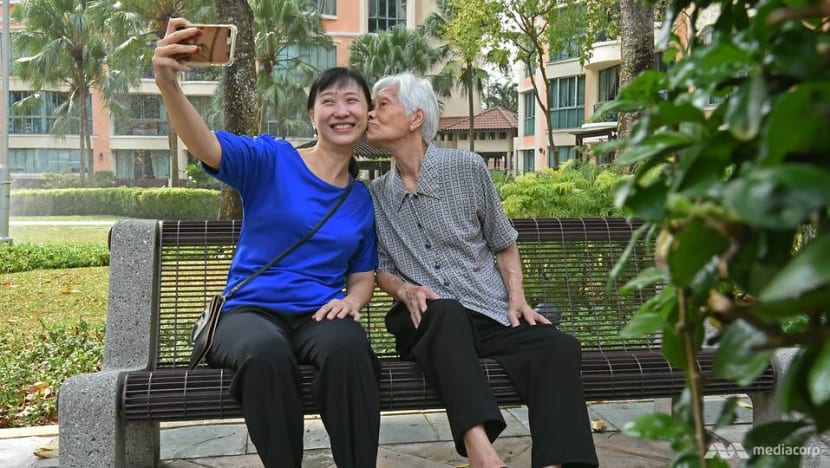
Stella Lin Bin and her mother-in-law, who has dementia. (Photo: Hanidah Amin)
SINGAPORE: It was a typical Friday morning for 85-year-old Leung Fong Yee, who shuffled slowly about the Choa Chu Kang apartment doing her daily chores.
She greeted this reporter without emotion, and did not seem to mind the company, although her 50-year-old daughter-in-law Stella Lin Bin said it took time, patience and medication for the elderly woman to adjust to her diagnosis of dementia and depression.
Describing her mother-in-law as a strong, capable woman, Stella said the octogenarian used to visit Chinatown on her own, but has stopped doing so as she could lose her way now.
Today, she remembers only two routes: One to a nearby coffee shop, and another to the home of a fellow senior whom she is fast friends with.
Already, Mdm Leung is starting to forget people, said Stella. She remembers those she sees on a daily basis, but cannot remember her son who lives in Hong Kong and those she sees only rarely.
Stella noticed a change in her mother-in-law’s behaviour about three years ago.
Mdm Leung, a Singapore permanent resident, would repeat old stories of her time in Hong Kong, mixing up her memories from the Second World War, and the 1967 leftist riots in the former British colony.
On top of this, she would claim that her belongings had gone missing, and asked family members “which auntie took my things”, and spewed negative comments.
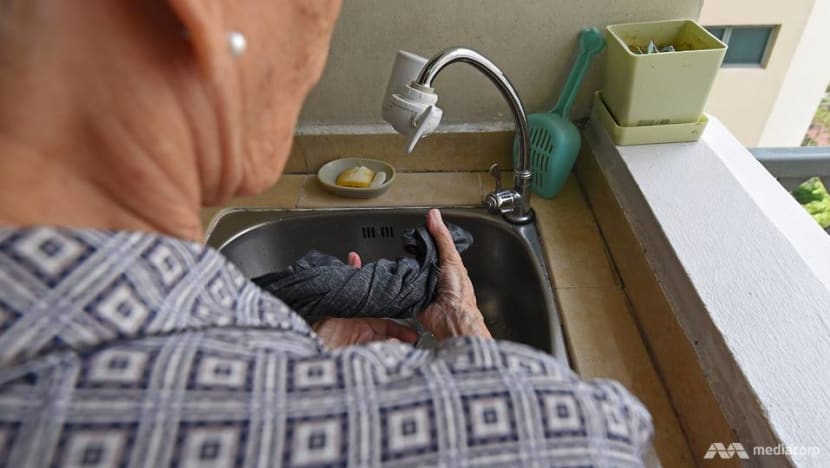
Sensing something amiss, Stella took her mother-in-law to Choa Chu Kang Polyclinic.
In the six months that followed, Mdm Leung’s condition worsened. She threw tantrums, thinking that “everyone was her enemy”, and became increasingly negative.
Stella would be woken up in the middle of the night by the sounds of the elderly woman crying, and find her things missing only to learn later that her mother-in-law had taken them.
Specialists later confirmed that Mdm Leung was suffering from dementia and depression, and she was prescribed medication.
Mdm Leung was also referred by the polyclinic to non-profit organisation Fei Yue Community Services, which provides free counselling and check-ups for dementia patients.
In the beginning, she would not take the medication properly, taking it all in one go and making snide remarks in Cantonese such as “you’re treating me like I’m sick”.
It took some time for Mdm Leung to open up to the workers from Fei Yue, but she did so eventually and her condition has now stabilised thanks to a combination of medication, counselling and shifts in lifestyle that Stella has made.
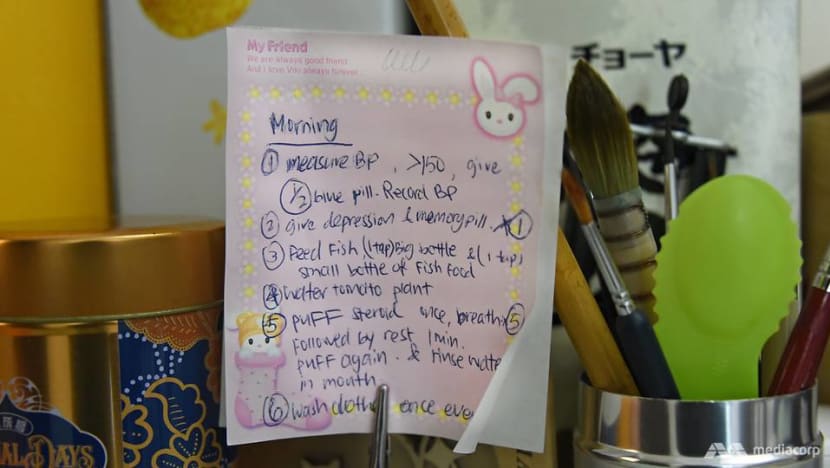
“Now we know it's a sickness, we will know to comfort her, and she seldom flares up,” said Stella.
Mdm Leung takes pride in being able to wash the dishes, do the laundry and mop the floor, tasks that Stella lets the older woman do, even though she says “it’s easier for me to do it, since I can do it quickly”.
The little duties entrusted to her let her feel that she has responsibilities, explained Stella.
“It makes her feel like: ‘I’m very important in this house, I have a contribution, I’m still OK’,” she said.
Stella also encourages Mdm Leung to have more social interaction, and entrusts her with the care of a cat - a duty the elderly woman takes seriously.
As dementia is an incurable disease, doctors have told the family that Mdm Leung’s condition is likely to progress, but the goal is to delay it.
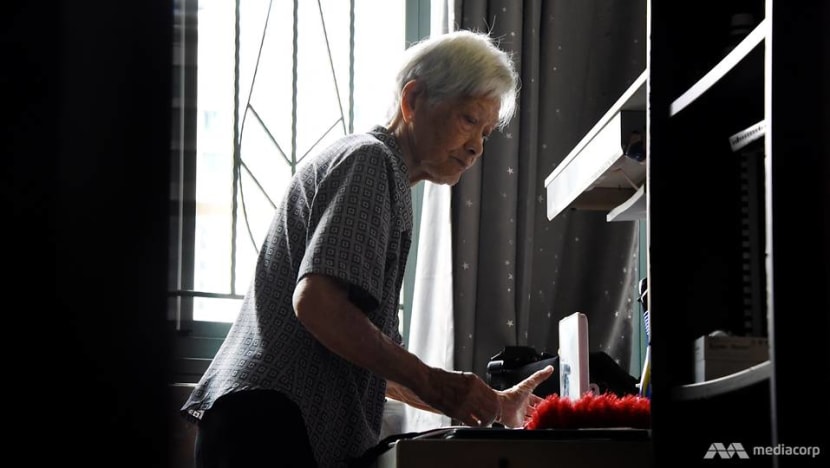
Mdm Leung's situation is not rare: One in 10 seniors in Singapore above the age of 60 is currently diagnosed with dementia, according to statistics from the Ministry of Health (MOH), with the number of people suffering from the condition set to grow as the population ages.
"This translates to an estimated 82,000 cases in 2018, with the number expected to go beyond 100,000 by 2030," Jason Foo, CEO of the Alzheimer’s Disease Association (ADA), told CNA.
THE PROBLEM OF CAREGIVER STRESS
While she copes with her mother-in-law's condition, Stella is also acutely aware of the need to focus on her own needs.
"Caregivers are increasingly facing more stress and burnout due to round the clock caregiving," said Mr Foo.
"They themselves may start to feel social isolation due to the 24-hour care they provide, making it very difficult for them to maintain friendships or relationships outside their charges or family."
He added that some people with dementia may also take their frustrations and aggressions out on their caregivers whether verbally or physically.
Stella makes an effort to make time for her own hobbies, which range from dance and art classes to photography. The avid photographer’s latest obsession is sports photography, she shared, excitedly swopping camera tips and tricks with CNA’s own photojournalists.
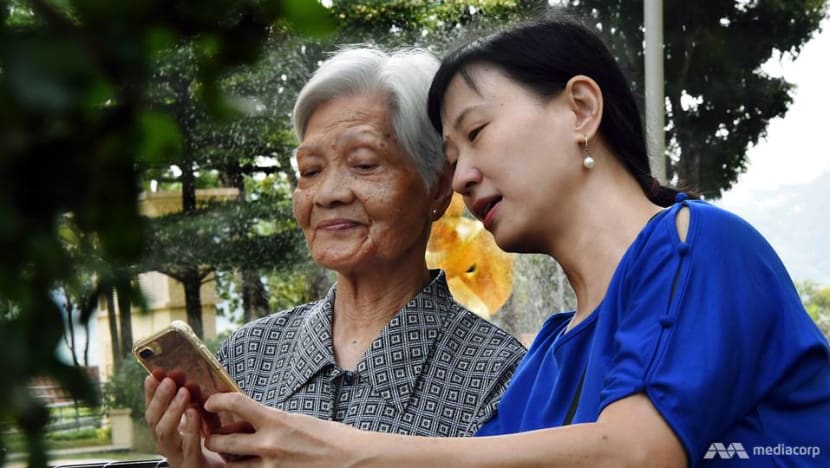
She advises fellow caregivers not to lose their sense of self and to avoid over-caring such that the dementia patient is deprived of their own agency.
“Don’t tell yourself that - in my life, all that’s left is caring for my family,” she said. “You have to have your own social circle and things you like to do.”
She initially felt frustration over her mother-in-law’s condition, but learned from counselling sessions with Fei Yue how to express her feelings to friends.
“There are sometimes caregivers who may not have the patience that Stella has, and usually they will get a maid to take care of the elderly,” said senior social worker Sng Bee Li, who cared for Mdm Leung after she was referred to Fei Yue’s community intervention team.
“Even if they have a maid, we will encourage them to have daycare … so they will have some social interaction to keep the mind active."
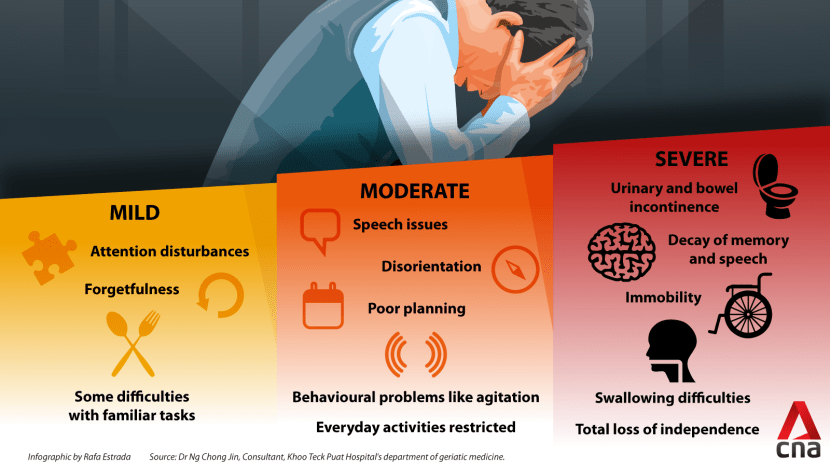
WHAT'S BEING DONE TO SUPPORT DEMENTIA PATIENTS, CAREGIVERS
Fei Yue's community intervention teams are part of support networks, led by health professionals, made up of counsellors, social workers and nurses. The free services they provide include assessment, counselling and psychoeducation for clients with mental health conditions and their caregivers.
There are 20 community intervention teams, partnering general practitioners and polyclinics and focusing mainly on adults and seniors with mental conditions like depression, psychosis and dementia, with 39 supporting community outreach teams that take over when the conditions have stabilised.
The establishment of the teams is part of steps taken by MOH and the Agency for Integrated Care (AIC) in scaling up resources to provide for seniors with dementia and their caregivers.
An MOH spokesman told CNA that its strategy for dementia focuses not only on those already diagnosed with it, but also on outreach efforts to increase awareness and early detection.
Some moves by the ministry include adding 1,000 dementia day care places in 2018, launching a Dementia Friends mobile app that provides tips on caregiving and allows caregivers to post information about missing loved ones, and increasing the number of polyclinics offering mental health and dementia services to 12.

At the doctor level, more than 190 GP partners have been trained as of December 2018 to diagnose and support people with mental health conditions, while most doctors undergoing specialty training since 2014 are required to take part in a geriatric medicine modular training programme, which includes a dementia module.
There are currently eight dementia-friendly communities including Yishun, Queenstown, Bedok, and Woodlands, where areas are adapted to be dementia-friendly with ramps and large text on signs, and this is set to increase to 15 by 2021, MOH said.
There are also more than 200 go-to points across Singapore with dementia resources that also act as safe return points for those with dementia.
Looking to the future, the government also supports dementia research, with the National Medical Research Council awarding the National Neuroscience Institute a $1.7 million grant for research on the onset of dementia among the young in Singapore, said MOH.
For Stella, the family focuses on each day as it comes.
“The medication is to delay the onset of the illness,” she said. “The most important thing is to let her be happy.”














